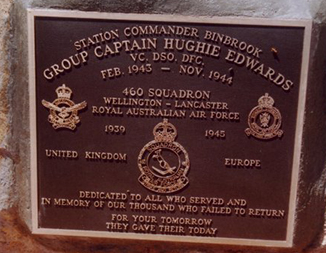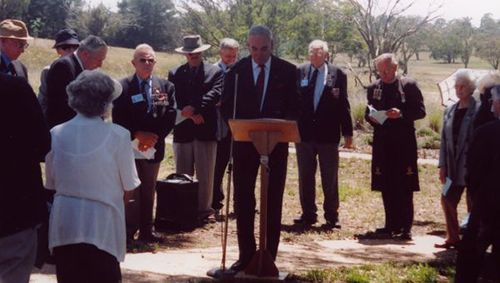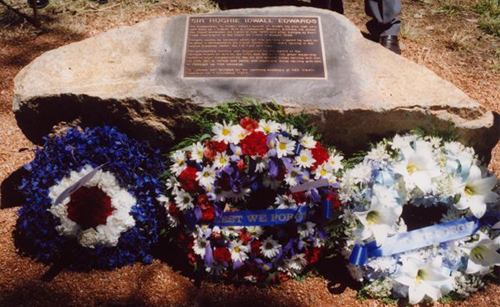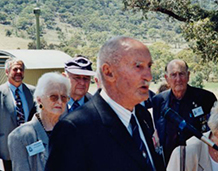

Welcome and Introduction, Laurie Woods, DFC, President, Queensland Branch, 460 Association.
We are gathered here today to honour the late Hughie Edwards, by placing a lasting acknowledgement of him.
It would be difficult to touch the centre of your wartime experience and relate to the frightening odds and colossal forces of threat and danger you faced as aircrew members; many instances of heroic courage, bravery and self–sacrifice came to the fore, and it is the endemic constancy of your human effort that makes your story so great and one to be treasured. Hughie Edwards on the squadron was always at our side and the mention of him was a tower of strength to all of us.
In his time as Binbrook Station Commander, the home of 460 squadron, Bomber Command’s top record breaking squadron. G/Capt. Hughie Edwards had seven squadron commanders, each of them receiving a DSO, yet he was possibly the only station commander during the war who awarded higher honours for his command of this famous station, his ever continuing flights over enemy territory as an aircrew member of 460 squadron, his courage, his leadership, and more especially his presence was an inspiration to all the aircrew of 460 squadron.
We will never forget him.
Address by Air Marshal Ray Funnell, AC (Retd)

Before unveiling the plaque to Hughie Edwards, I would like to give some views on the man, his time, and the very different world in which we now live. Hughie Edwards was an extraordinary man who led an extraordinary life. Many people here today knew him personally and are more versed in the details of his life than I am. Nevertheless, it is worth recounting some of those details. An extraordinary life? Indeed it was.
Having left school at age 14, he subsequently became a combat pilot, squadron commander, winner of the Victoria Cross, Station Commander, professional military officer, corporate executive, Governor of Western Australia and knight of the realm. Now, that is extraordinary. Only six years after joining the RAAF as a Cadet, he was a Wing Commander, a combat pilot and the Commander of a front–line squadron engaged in the most terrible aerial conflict that this world has ever seen. His distinguished combat service is indicated by the awards he received for that service:
The Victoria Cross, the Distinguished Service Order and the Distinguished Flying Cross.
And that was in combat of a savagery and lethality that has seldom been seen in human conflict. Hughie Edwards deserves a place of honour in our nation’s history and the veterans of No 460 Squadron have been determined that he should have it. Although he was never a member of the squadron, he was the Station Commander of Binbrook, the home base of the squadron during the most important phase of its history. He flew frequently with the squadron, and there can be no doubt of his feeling for the squadron and its personnel, a feeling that was strongly reciprocated.
The words of Laurie Woods this morning demonstrate that most emphatically.
No 460 Squadron deserves special mention. It was arguably the premier squadron in the Royal Air Force’s Bomber Command in World War II. Night after night, month after month, year after year, the ground crew prepared the aircraft and the aircrew flew them into that combat furnace over Europe. The commitment was enormous; the ferocity of the combat unlike anything previously experienced; and the loss of young men was truly terrible.
In today’s world, the publics of the Western nations expect victory without casualties, to our side that is. Such was not the expectation 60 years ago. Consider these awful statistics: more Australians were killed in 460 Squadron than were killed in the whole of the Korean War; more than in the whole of the Vietnam War. Just that one squadron lost more men in three years than the Australian Defence Force has lost in all of the conflicts in which it has engaged since the Second World War.
I hope that the publicity surrounding one of the squadron’s aircraft, the fabled G for George, as it is re–established this weekend in the Australian War Memorial will generate interest in not only the aircraft but also the squadron and the men who serviced and operated it, the conflict in which it was engaged, and the awful truths of modern warfare. That perhaps will help people to comprehend the futility of war and the terrible price that we pay, and especially that we ask young men and women to pay, to settle international disputes.
Perhaps too, it will generate a better appreciation of the calibre of the men and women of that extraordinary generation that brought us through the Great Depression and achieved victory for the Allied nations in 1945.
Extraordinary men such as Hughie Edwards and those who served with him.
This plaque in this Memorial Grove will honour both him and his comrades.
 Sir Hughie Edwall Edwards Plaque (View Larger Image)
Sir Hughie Edwall Edwards Plaque (View Larger Image)
Remembrance by Air Commodore Keith Parsons, CBE. DSO. DFC. AFC.
I Remember Hughie Edwards in August, 1935, when after joining the RAAF on the 13th July,1935, and passing the initial training he was allocated to me as my pupil. In his training he wasn't a particularly gifted pilot, but he was a very determined one and worked very hard. At the end of his course he was one of four selected to join the RAF in England. Shortly after commencing flying in England he had a very bad accident in a Blenheim. Unfortunately in bailing out, his chute got caught in the tail, and he crashed with the plane, being extremely lucky to survive. Unfortunately he was left with a severe limp for the rest of his life.
Hughie Edwards was typical of an Australian pilot, everyone of you here showed the same devotion and determination to carry out our job. Hughie didn't know the meaning of turning back, that is why he earned his VC. He lead an attack on Bremen, in Bleheim bombers and lost four of his squadron but Hughie stayed there and pressed on with a determination which you people showed when I commanded you.
You all can take a share of the memories of this plaque, although we didn't get VCs we showed the same Australian determination that Hughie Edwards showed and we are so proud of him. I was very fortunate in training two VC winners. Another in addition to Hughie was Flight Lieutenant Newton a VC winner in the New Guinea area.
I am so proud to be associated with 460 squadron and proud to have been associated with Hughie Edwards and we can all share that pride together with this plaque.
Thank you so very much.